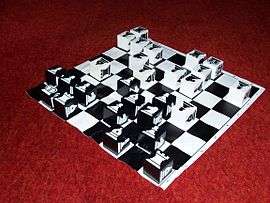Cubic chess
|
A Cubic Chess game in progress | |
| Designer(s) | Vladimír Pribylinec |
|---|---|
| Years active | Current rules since 2008 |
| Genre(s) |
Abstract strategy game Chess variant |
| Players | 2 |
| Setup time | ~1 min. |
| Playing time | Casual games usually 10–60 mins. |
| Random chance | None |
| Skill(s) required | Strategy, tactics |
| Synonym(s) | Echos |
Cubic Chess is a chess variant invented by Vladimír Pribylinec beginning with an early version (named Echos) in 1977.[1][2][3] The game substitutes cubes for the chess pieces, where the four faces of each cube display a different chess piece (pawn, knight, bishop and rook), two blank are orientated to the players. The symbol of king and queen are only on one side of the cube. This provides an efficient means (rotating the cube on a square) to change a piece's type.
The game begins like standard chess, with a normal 8×8 chessboard, and cubes rotated so that uppermost faces reflect the standard chess starting position.
Game rules
Cubic Chess follows the normal rules of chess (including castling, check, checkmate, etc.), but with the following special differences:
- Non-pawn pieces that become captured, are retained by the capturer—unrotated—in to off-board "stock".
- For his turn, a player may either:
- make a normal chess move using one of the pieces already on the board; or
- rotate any pawn uppermost his cube to any piece type contained in the player's "stock". A corresponding piece in the stock is immediately removed from the game.)
Sample game
Note on notation: When a pawn is rotated to display a new piece type, the new piece is written in parentheses, for example: 6...h7(B).
1.e4 e5 2.f4 exf4 3.Nf3 d5 4.e5 Bg4 5.d4 Nc6 6.Bb5 Bxf3 7.Qxf3 a7 (N) 8.Bxc6 Nxc6 9.c3 d5(B) 10.Qf2 Rxa2 11.Rxa2 Bxa2 12.Nd2 h7(R) 13.h3 Be7 14.0-0 f3 15.Qxf3 Bd5 16.Ne4 Rh4 17.Nd6+ Bxd6 18.Qxd5 Nf6 19.Qf3 Bxe5 20.Re1 Nxd4 21.Rxe5 Kf8 22.cxd4 f7(N) 23.Be3 Nxe5 24.dxe5 b7(R) 25.exf6 gxf6 26.Bf2 Ra4 27.g2(R) Ra1+ 28.Kh2 Rxb2 29.Qg4 Qd6+ 30.Bg3 Rxg2 31.Kxg2 Qd2+ 32.Kf3 Ra3+ 33.Ke4 Ra4+ 34.Kf5 Qd5+ 35.Kxf6 Rxg4 36.hxg4 Rh6 ++
See also
- Crazyhouse
- Cubic Shogi—a shogi variant by Vladimír Pribylinec
References
- ↑ Pritchard (1994), p. 78
- ↑ Pritchard (2007), pp. 162–63
- ↑ Beasley (2005), p. 59
Bibliography
- Beasley, John (May 2005). "Cubic Developments". Variant Chess. British Chess Variants Society. 7 (48). ISSN 0958-8248.
- Pritchard, D. B. (1994). "Cubic Chess (II)". The Encyclopedia of Chess Variants. Games & Puzzles Publications. ISBN 0-9524142-0-1.
- Pritchard, D. B. (2007). "Cubic Chess [Pribylinec]". In Beasley, John. The Classified Encyclopedia of Chess Variants. John Beasley. ISBN 978-0-9555168-0-1.
External links
- Official website includes free download
